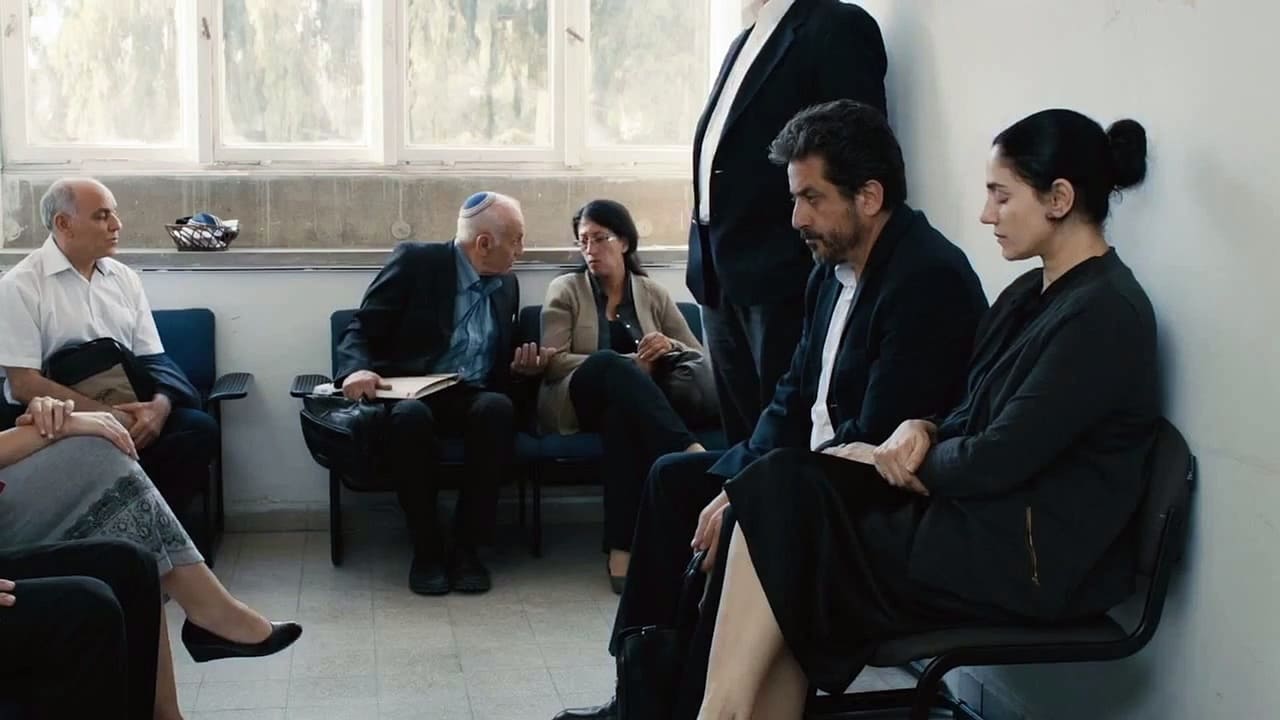

Obtaining a divorce proves challenging for a woman in modern day Israel who by rabbinical law requires her husband's consent in this evocative drama. The film benefits greatly from the daring decision to set the film entirely in court despite the story taking place over months and years. Without external scenes to dissipate the tension, 'Gett' quickly becomes nail-bitingly intense. It also places us very much in the shoes of the rabbinical panel presiding over the case who only ever see what is presented to them in court, not what happens between the couple outside. This also means that we are given precious little insight into why exactly she wants the divorce; almost all the character witnesses call her husband an honorable man, and he does not beat or neglect her, however, the point of the film is not why she wants the divorce but the difficulty of getting one and it is actually refreshing how the film does not dwell on the negatives of their marriage. What does not quite work so well is only revealing towards the end why the husband is so reluctant to divorce her. We are positioned to see him as a stubborn and arrogant individual for the most part, whereas the film gets a whole lot more interesting when we actually come to understand his reasoning. Whatever the case, the overall film leaves an indelible impact that is hard to shake; it is emotionally draining in the best possible way.
... View MoreDetermined in its aim, the brother and sister Elkabetz have brought to the screen to much acclaim 'Gett: the Trial of Viviane Amsalem'. Like many Israeli film that attacks Israel's sacred cows, 'Gett' takes place in a closed universe of a courtroom, as though we are in a theater. Viviane Amsalem sues for divorce--a 'Gett'Only a religious court can dissolve the marriage, but Elisha Amsalem refuses to allow it, to the extent he at first refuses to appear in court; then does but remains firm in his refusal. Israel like most Muslim and Arab countries leaves issues such as divorce and inheritance and other matter touching the personal sphere in the hands of religious authorities. A practice that goes far back in time. So during five years, Viviane Amsalem suffers abuse by the rabbis and the contempt of her accusers for not being a good Jewish wife. Her husband initially is seen as a model spouse, but mittendrin it turns out that Elisha is intolerant, intransigent and contentious. So, after 30 years of marriage, Viviane files for divorce; she has moved out of the house, gone to her sister's. Nonetheless, she prepares food daily for husband and her only son who remains at home. She is a hairdresser with her own business and a will of her own. On the other hand, Elisha treats her as his property--professing undying love--but won't let go until at the end he signs the divorce, but at a price which prejudices Viviane's happiness. Yet, she is free of him. It is good to see Simon Abkarian in the role of Elisha. This seasoned actor gave a good turn in Michel Deville's 'Almost Peaceful'. Ronit Elkabetz us a study in wifely suffering, and absolutely beautiful. The Hebrew is peppered with words of Moroccan Arabic, and moments of French since the protagonists are of Moroccan origin settled in Israel of long date. 'Gett' is a blow for women's rights. And a winner. In Europe and North America say Beit Dins exist to grant divorce for Orthodox Jews. (In Israel only Orthodox practices are allowed for a gett.) Luckily, divorce exists in the civil sphere, but in the eyes of the pious Jews, a woman without a gett is wayward and nothing better than a prostitute. A word or two, on the presence of Arab Jews in Israeli cinema and stage, although they are not considered the equal of Jews of European ancestry. Isn't Israel a European construct, with non-European Jews for the numbers to take possession of land?
... View MoreThe matter of divorce is an Israel-only problem where power over marriage and divorce is in the hands of the rabbinate. As the IMDb Summary notes, civil marriage and divorce does not exist in Israel. Thus Gett may be incomprehensible to non-Jews outside Israel where marriage is a civil matter but can be licensed to religious authorities. Judaism has this further peculiarity that the man must consent to the bill of divorce (the Get)for the divorce to take place. Normally,this is a formality and Israeli couples can part and resume their lives.Without a Get, neither spouse can remarry. If the man abandons his wife and leaves the country, the woman is in a legal limbo. This was the subject of an earlier short Israeli film, Ha-Get. In Gett, the man is available but refuses to consent. The Rabbis try all the limited avenues available to force consent (take away the driver's license, jail, etc.) but can't force the man to sign. That is the basis of Gett.I have given Gett a 9 despite the lack of action and the focus on a less than universal problem. My reason is that, while watching Gett, I found similarities to the classic 12 Angry Men. I realize that it's a different courtroom and type of case on trial but that static tension is present in both films. The second reason is the acting skills displayed, particularly by Ronit Elkabetz. Even if you knew nothing about the divorce problem in Israel, you can read in Ronit Elkabetz' character the agony and frustration that getting a Get can cause.I highly recommend Gett.
... View MoreGreetings again from the darkness. Personal views on Politics and Religion are purposefully avoided in my film reviews as I prefer to view the work from the perspective of art and storytelling. Sometimes, however, a film exposes such an injustice that stifling one's opinions is just not practical. Such is the case with this latest from the brother-sister co-directing and co-writing team of Shlomi and Ronit Elkabetz.This is the final piece to the creative siblings' trilogy on Israeli marriage that began with To Take a Wife (2004), and was followed by 7 Days (2008). That's right, the two characters of husband Elisha (Simon Ebkarian) and wife Viviane (played by director Ronit Elkabetz who was also in the excellent 2007 film The Band's Visit) have been followed through the stages of marriage, separation, and now divorce court. Only their divorce court is not what most of the world thinks of when we hear that term. In Israel, divorce is not a civil matter, but rather falls under Jewish law and the proceedings are overseen by a triumvirate of rabbinical judges. If that's not difficult enough to stomach it's the husband who holds ALL the power. The husband must agree to grant his wife the divorce. Without his permission, the judges can do nothing and the wife is bound to the marriage.With the story unfolding almost exclusively in the bleak courtroom, Viviane trudges through delays, no-shows, desperate negotiations, and other time-wasters; only occasionally succumbing to an outburst, rather than her usual quiet dignity. Elisha maintains a seemingly proud and determined look when he does show for hearings, only periodically shooting a look of disgust at his wife. His confidence stems from the power in knowing that grounds for divorce do not include irreconcilable differences. The camera work puts us right in the courtroom and we soon recognize Elisha's mannerisms as not just passive-aggressive, but also manipulative and misguided. He is not an awful man, but this is an awful marriage.Long a fan of courtroom dramas, I was mesmerized by the dumbfounding process as well as the stellar performances, excellent script and POV camera work. Ms Elkabetz is terrific as Viviane, and her work is complimented by Mr Ebkarian as her husband, Sasson Gabay as his brother and advocate, and Menashe Noy as her advocate and admirer. The film is a strange blend of hypnotic and infuriating and heart-breaking. It's uncomfortable to watch, but one we can't turn away from especially as Viviane shouts "You don't see me!" to the judges.
... View More